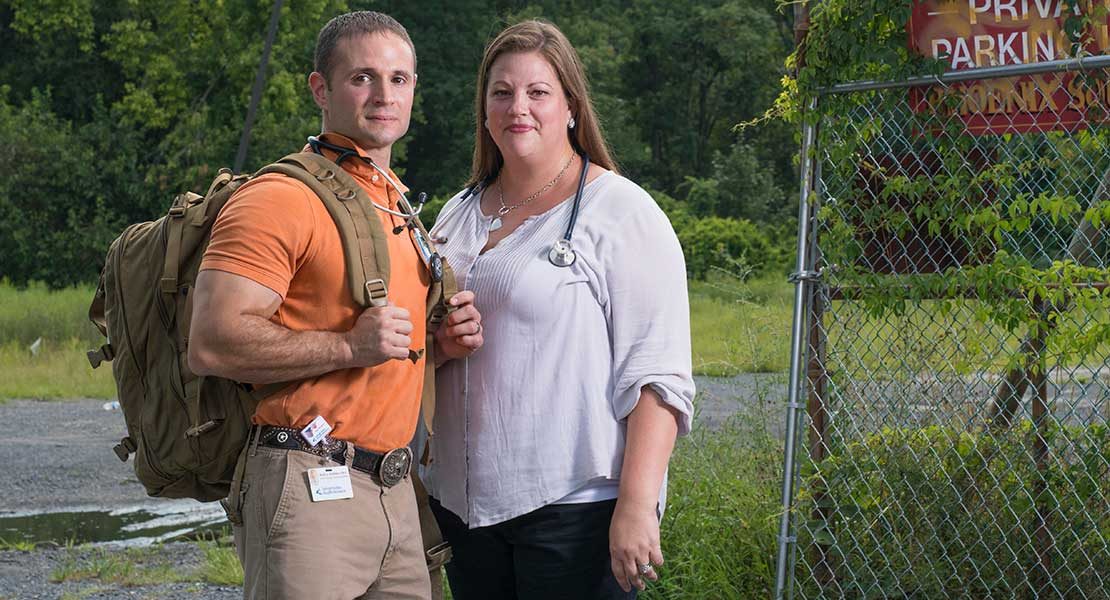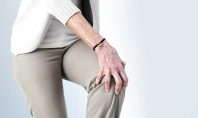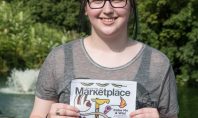Street Medicine

Brett and Corinne Feldman are humble people.
The husband and wife are responsible for igniting a movement of providing healthcare for the region’s homeless, but won’t take credit for it. Instead, they dole out praise to the disenfranchised who trust them, the students who dedicate hundreds of hours to the couple’s cause, and the people who believed in a wild idea.
Corinne attended Midwestern University and became a certified physician assistant in 2005. After she graduated, the couple moved to the Lehigh Valley and Brett followed suit. He enrolled at DeSales University and earned his title as a C-PA two years after Corinne. The duo came to Pennsylvania with strong backgrounds in volunteerism: growing up, goodwill was always an important factor in Corinne’s family dynamic. She was taught to treat the impoverished with respect and kindness. Brett realized his passion for working with the homeless when he immersed himself in volunteer work while his wife attended Midwestern.
The altruistic couple was eager to lend support to the area’s homeless once they moved to the Lehigh Valley, but they quickly realized organizations offering medical help were sparse.
“There were screenings, but nothing comprehensive,” Corinne explains. “If you have high blood pressure, what are you doing with that person? You’re not giving them any way of solving that problem.”
So, they hatched a plan.
One year into his studies, Brett approached the DeSales’s faculty with Corinne about their idea about opening a free clinic through the school. “I remember going into the office and pitching this idea of street medicine,” recalls Corinne. “We said, ‘We have this idea and it’s crazy. We’re going to dig in and have a presence with a population that needs us.’”
Maybe the idea wasn’t crazy. Maybe it was a necessity.
In 2007, the DeSales Free Clinic opened at the Allentown Rescue Mission and is run almost entirely by students in the physician assistant program. Men at the mission are treated for conditions such as diabetes, psychiatric illness, drug abuse, head injury, traumatic brain injuries, and exposure injuries such as frostbite. Cardiologists, podiatrists, otolaryngologists, and endocrinologists all volunteer time to ensure medical needs are met.
For the first seven years, all financial resources for the clinic came from private donors and student fundraisers like bake sales and 5k races. Furniture to outfit the clinic were hand-me-downs, including chairs from the Feldmans’ own dining room. “We hit up everybody we knew for donations,” says Brett. Corinne adds, “About three years ago the president of DeSales gifted us with a wonderful endowment that allowed us to have money that covers our operating costs every year.”
Though Corinne is executive director of the clinic, she works full-time as an assistant professor for the very program from which Brett graduated. Upon taking the position, she implemented mandatory shifts at the rescue mission for all physician assistant students, making DeSales one of the few schools in the country to require volunteer medical work with the homeless.
“The underlying messages we try to teach are how dehumanizing being homeless is,” says Corinne. “They spend most of their lives being invisible in front of other people. We can humanize each other in very simple ways. Make eye contact, smile, say hello.”
Students are taught to approach patients with the mentality of “There you are. Let’s get through this together,” not “Here I am. I can fix you.”
As a co-founder of the clinic, one of the most important things to Brett is teaching students how to relate to and interact with homeless patients. He says medical students often learn to disengage emotionally from patients. Brett defies that logic and tells students to share in their suffering. “You can only learn that by going to the people,” he says. “You can’t learn that in school or a hospital.”
David Zinni met the Feldmans 10 years ago while he was staying at the mission. He was 21, homeless, and in need of medical care.
“They treated me with love and respect,” says David. “Working with this population can be intimidating because of the stereotypes and the nature of homelessness. People here are in a rough spot, down and out. It definitely takes heart to want to take care of these people.” Brett and Corinne ensured their patient received the care he needed, including a physical so he could obtain a driver’s license. Today, David works full time at the Allentown Rescue Mission, and he and his wife have a son.
“I wouldn’t be where I am today if it wasn’t for people who wanted to help me,” David says.
To combat stereotypes, Corinne and Brett extend their compassion training beyond medical students. They have three young children at home and don’t shy away from discussions about homelessness and why people find themselves living on the street or in a shelter. The awareness created from these conversations, whether with children, millennials, or grandparents, are considered the foundation of the free clinic. To treat the under-served, we must first try to comprehend the trajectory of their lives.
About 1,500 men visit the clinic each year, but Brett says that only provides a sliver of what the population needs. Community collaboration is at an all-time high among Bethlehem, Allentown, and Easton, to ensure men and women also receive food, shelter, and clothing. The Feldmans have aimed a spotlight on the efforts and achievements here in the Valley and other innovative, philanthropical medical professionals have noticed. Next month, Allentown will host the annual International Street Medicine symposium.
Since Brett and Corinne have entered the scene, David has witnessed a growing understanding within the community concerning the homeless population.
“Just remember that, whether they made poor choices or have been affected by poor choices, they deserve the same kind of respect and dignity anybody else does,” David says. “They’re human beings.”
To learn more, visit streetmedicinelehighvalley.org.















